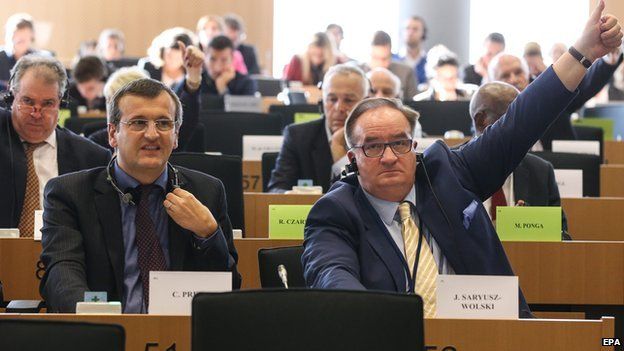New EU commissioners face MEP grilling in Brussels
- Published

It is the MEPs' job to keep the European Commission under close scrutiny
The nominees for posts in the next European Commission are facing confirmation hearings in the European Parliament - and some tough questioning is expected.
The shake-up of portfolios by EU Commission President Jean-Claude Juncker has upset many MEPs, the BBC's Chris Morris reports from Brussels.
The UK's Lord Hill has been assigned to financial services and capital markets. His hearing is on Wednesday.
MEPs can block Commission appointments.
Each would-be commissioner faces a public grilling, external lasting several hours.
Many of the questions will be about technical details of policy, less than three weeks after the nominees found out which job each of them had been given.
The hearings will be televised live on the European Parliament website., external
Conflicts of interest?
Among those under particular pressure from MEPs are the Spanish and Hungarian nominees, as well as Lord Hill, our correspondent says.
A former lobbyist, he is likely to come under close scrutiny because of the Conservatives' Euroscepticism and concern about the power of bankers in the City of London.
The hearings will begin with Sweden's Cecilia Malmstroem (Trade), followed by Karmenu Vella of Malta (Environment, Maritime Affairs and Fisheries).
The parliament is scheduled to vote on whether to approve the new Commission as a whole on 22 October.
There is particular concern among Green and Liberal MEPs that the climate action and energy jobs will be merged in one post, in the hands of a Spanish conservative, Miguel Arias Canete.
Some MEPs are also worried about having Hungary's Tibor Navracsics in charge of education, culture, youth and citizenship.
A former Hungarian justice minister, he is close to Prime Minister Viktor Orban, who clashed with EU officials over alleged curbs on civil liberties.
The European Commission took legal action against Mr Orban's government over several new laws, including data protection policy and the judiciary.
Vytenis Andriukaitis (Lithuania) Health and food safety
Miguel Arias Canete (Spain) Climate action and energy
Dimitris Avramopoulos (Greece) Migration and home affairs
Elzbieta Bienkowska (Poland) Internal market, industry, entrepreneurship and SMEs (small and medium-sized businesses)
Corina Cretu (Romania) Regional policy
Johannes Hahn (Austria) European neighbourhood policy and enlargement negotiations
Jonathan Hill (UK) Financial stability, financial services and capital markets union
Phil Hogan (Ireland) Agriculture and rural development
Vera Jourova (Czech Republic) Justice, consumers and gender equality
Cecilia Malmstroem (Sweden) Trade
Neven Mimica (Croatia) International co-operation and development
Carlos Moedas (Portugal) Research, science and innovation
Pierre Moscovici (France) Economic and financial affairs, taxation and customs
Tibor Navracsics (Hungary) Education, culture, youth and citizenship
Guenther Oettinger (Germany) Digital economy and society
Maros Sefcovic (Slovakia) Transport and space
Christos Stylianides (Cyprus) Humanitarian aid and crisis management
Marianne Thyssen (Belgium) Employment, social affairs, skills and labour mobility
Karmenu Vella (Malta) Environment, maritime affairs and fisheries
Margrethe Vestager (Denmark) Competition